The AMD 3rd Gen Ryzen Deep Dive Review: 3700X and 3900X Raising The Bar
by Andrei Frumusanu & Gavin Bonshor on July 7, 2019 9:00 AM EST** = Old results marked were performed with the original BIOS & boost behaviour as published on 7/7.
Gaming: Strange Brigade (DX12, Vulkan)
Strange Brigade is based in 1903’s Egypt and follows a story which is very similar to that of the Mummy film franchise. This particular third-person shooter is developed by Rebellion Developments which is more widely known for games such as the Sniper Elite and Alien vs Predator series. The game follows the hunt for Seteki the Witch Queen who has arose once again and the only ‘troop’ who can ultimately stop her. Gameplay is cooperative centric with a wide variety of different levels and many puzzles which need solving by the British colonial Secret Service agents sent to put an end to her reign of barbaric and brutality.
The game supports both the DirectX 12 and Vulkan APIs and houses its own built-in benchmark which offers various options up for customization including textures, anti-aliasing, reflections, draw distance and even allows users to enable or disable motion blur, ambient occlusion and tessellation among others. AMD has boasted previously that Strange Brigade is part of its Vulkan API implementation offering scalability for AMD multi-graphics card configurations.
| AnandTech CPU Gaming 2019 Game List | ||||||||
| Game | Genre | Release Date | API | IGP | Low | Med | High | |
| Strange Brigade* | FPS | Aug 2018 |
DX12 Vulkan |
720p Low |
1080p Medium |
1440p High |
4K Ultra |
|
| *Strange Brigade is run in DX12 and Vulkan modes | ||||||||
All of our benchmark results can also be found in our benchmark engine, Bench.
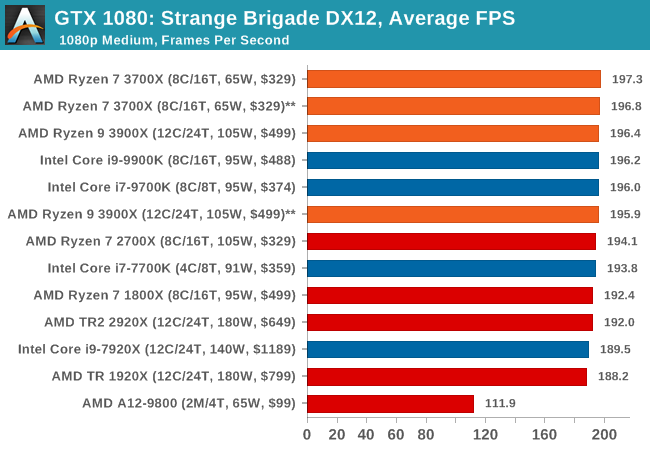
| Strange Brigade DX12 | IGP | Low | Medium | High |
| Average FPS | 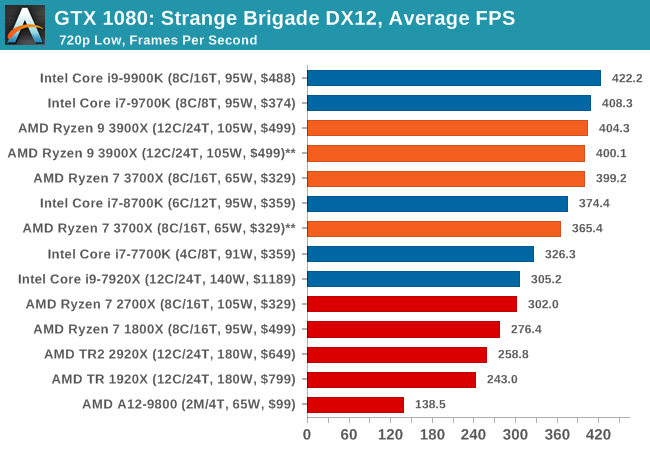 |
 |
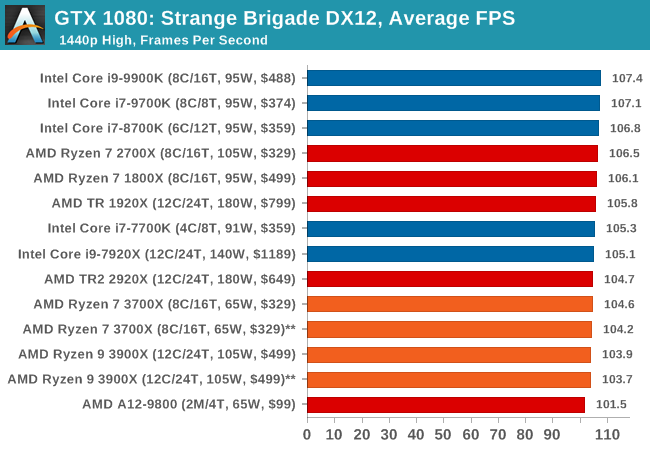 |
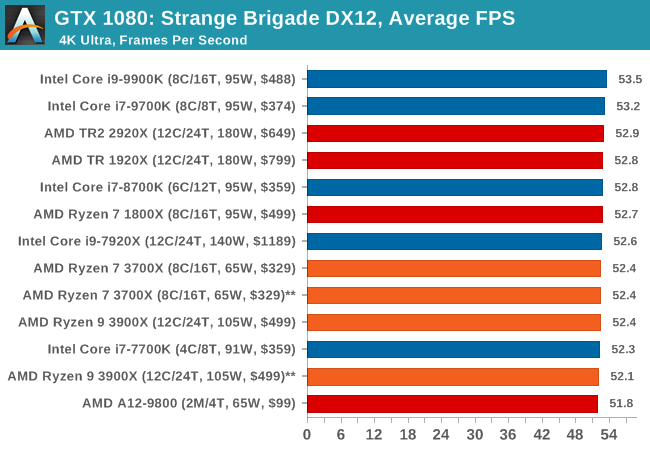 |
| 95th Percentile | 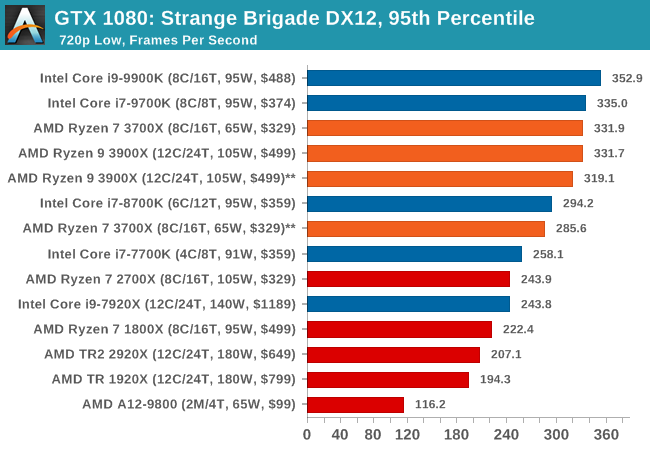 |
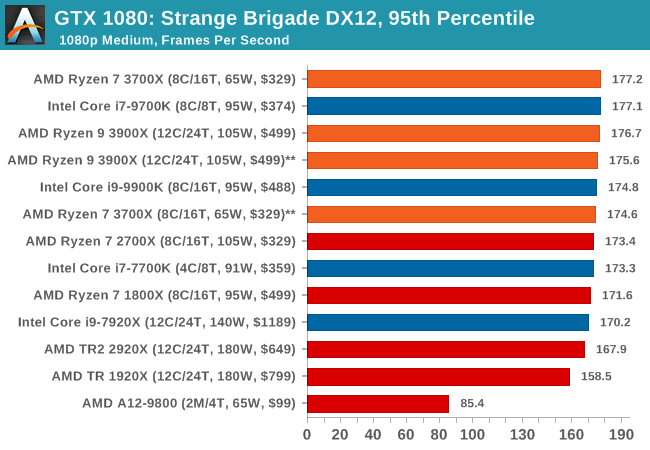 |
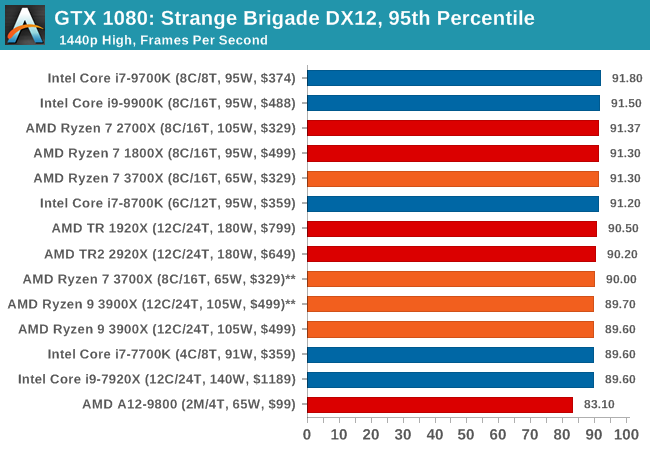 |
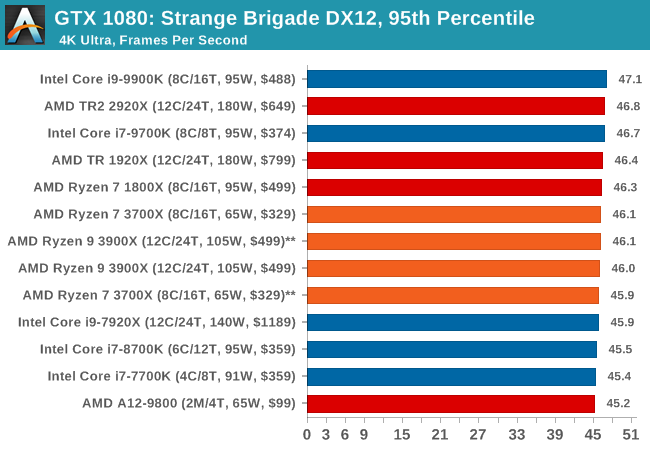 |
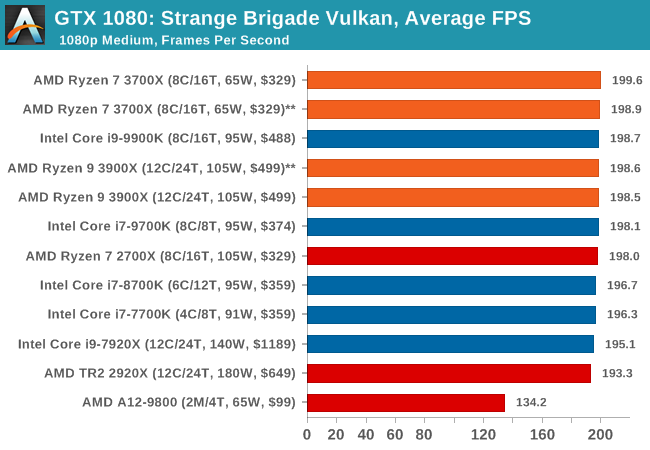
| Strange Brigade Vulkan | IGP | Low | Medium | High |
| Average FPS | 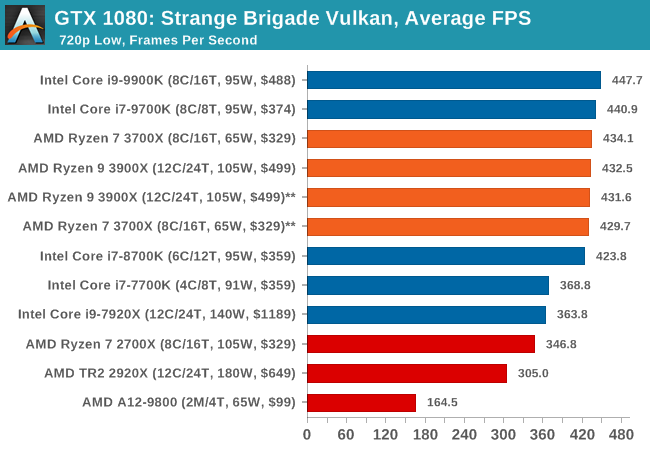 |
 |
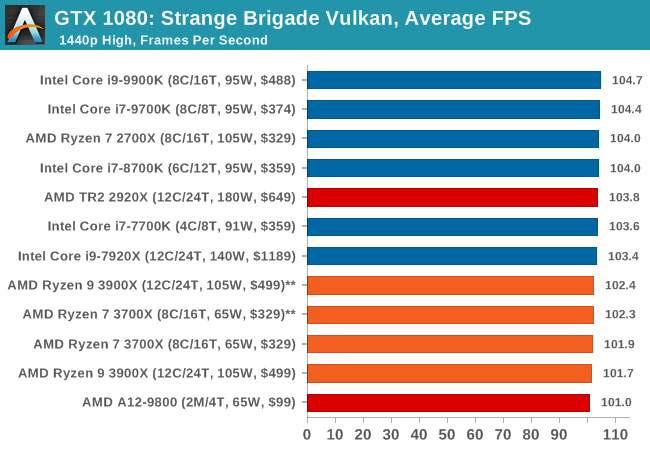 |
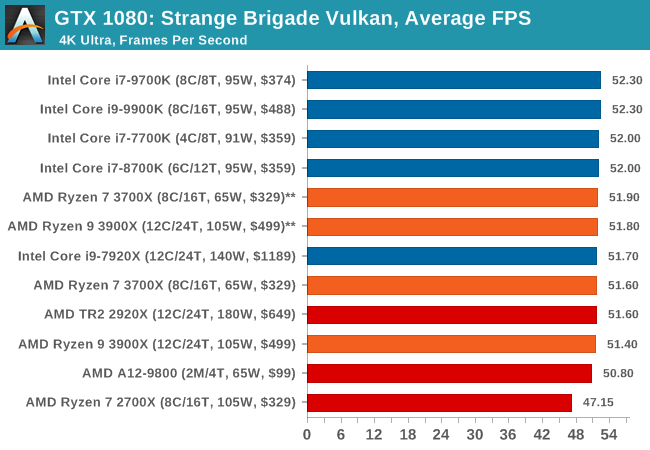 |
| 95th Percentile | 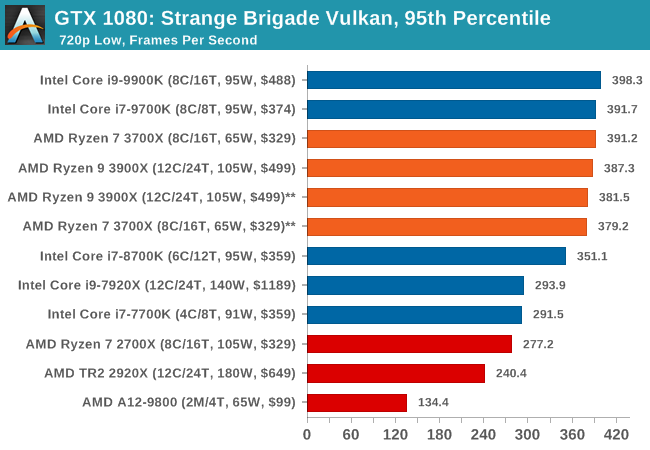 |
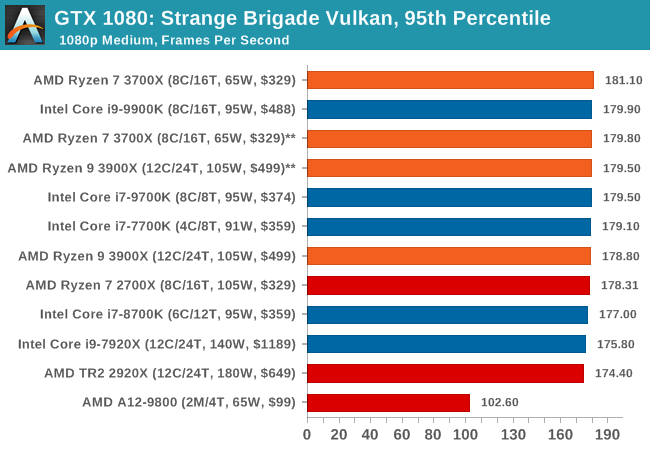 |
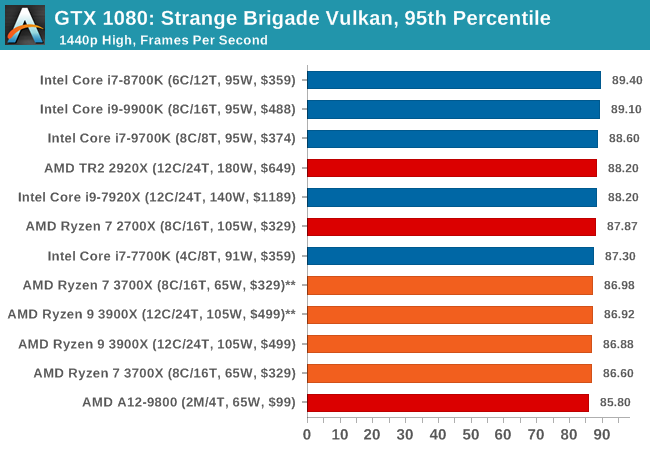 |
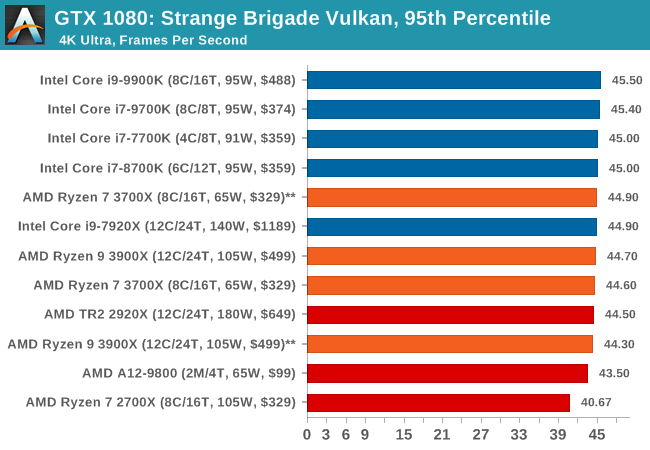 |


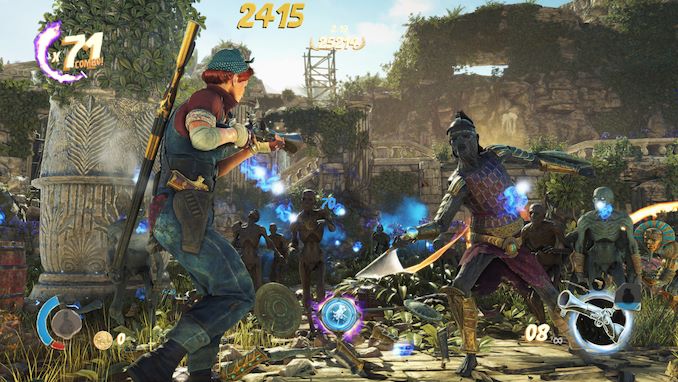








447 Comments
View All Comments
shakazulu667 - Sunday, July 7, 2019 - link
Is there a compilation test coming for chromium or another big source tree, that would show if new IO arch brings wider benefits for such CPU+IO workloads?Andrei Frumusanu - Sunday, July 7, 2019 - link
We'll be re-adding the Chromium compile test in the next few days - there were a few technical hiccups when running it.shakazulu667 - Sunday, July 7, 2019 - link
Thanks, I'm looking forward to it, especially curious if AMD can utilize NVMe better for this kind of workload.Andrei Frumusanu - Sunday, July 7, 2019 - link
Unfortunately we don't test the CPU suite with different SSDs for this.shakazulu667 - Sunday, July 7, 2019 - link
Is there another test in your suite that could show improvements with IO , incl NVMe?RSAUser - Monday, July 8, 2019 - link
But one of the big features is PCIe 4 support, so testing with an nvme drive as well to show difference would be important? People spending $490 on a CPU only are probably going to be buying an Nvme SSD.A5 - Monday, July 8, 2019 - link
There aren't any PCIe 4 SSDs for them to test with.0ldman79 - Monday, July 8, 2019 - link
Yep, PCIe 4.0 NVME is going to be beta at this point at best.Last I read the first 4.0 NVME to be released is essentially running an overclocked 3.0 interface, which the list of NVME that can saturate 3.0 is pretty short as it is.
RSAUser - Tuesday, July 9, 2019 - link
That's because these are the first PCIe 4 slots that exist, can't release a product that can't even be used.Using an overlocked drive in lieu of a 4 one is the proper thing to do.
Kevin G - Tuesday, July 9, 2019 - link
For consumers yes but the first PCIe 4.0 host system was the IBM POWER9 released ~18 months ago. As such there are a handful of NIC and accelerators for servers out there today.The real oddity is that nVidia doesn’t support PCIe 4.0. Volta’s nvLink has a PHY based upon PCIe 4.0. Turing should as well though nVidia doesn’t par those chips with the previously mentioned POWER9.